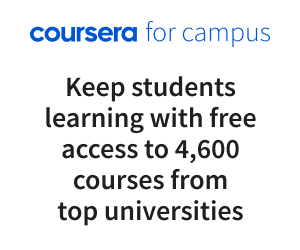
Universities must focus on the long-standing skills and experiences they offer students
As the higher education sector settles into an increasingly online mode of delivery, universities need to focus on durable skills and experiences that students cannot get elsewhere, Coursera CEO Jeff Maggioncalda told a session at Times Higher Education’s Digital Universities Week UK 2022.
The online education platform has more than 100 million users, as well as numerous partnerships with governments and businesses to upskill employees. Coursera partners with more than 200 universities and companies to offer online courses.
“Universities all over the world have published these courses to make them widely available,” said Maggioncalda. “It’s a little like textbooks – not everyone needs to write a textbook, not everyone needs to make a course…We’re just trying to make these courses more accessible.”
Similarly, a single institution cannot offer every course that its students may want or need to take. “In medical schools, for example, some doctors may need to know accounting,” Maggioncalda said. “This interdisciplinary ability can create students who are more well-rounded, especially in computer and data science.”
Courses in data skills, machine learning and programming languages remain the platform’s most popular courses, he said. However, Coursera does not replace what universities offer. In computer programming courses at university, for example, “you learn structures, principles of programmes. That general conceptual understanding is incredibly valuable,” he said. “For those who just learn a tool to complete a task, it becomes obsolete very quickly.”
“For a lot of universities with a residential experience, they can’t replicate that online,” he added.
However, universities are increasingly adopting additional online courses, although the level of uptake differs between regions, he said. South-east Asia has seen some of the fastest adoption, along with India and South America.
India, for instance, has seen booming interest in online education. The country “can’t build universities fast enough, and now they encourage online learning”, Maggioncalda said.
“The urgency and interest in a given academic institution often correlate to the question of whether students will keep coming to that university,” Maggioncalda explained. “And whether students keep coming to that university will be linked to their employment outcomes.”
Find out more about Coursera for Campus.










































































